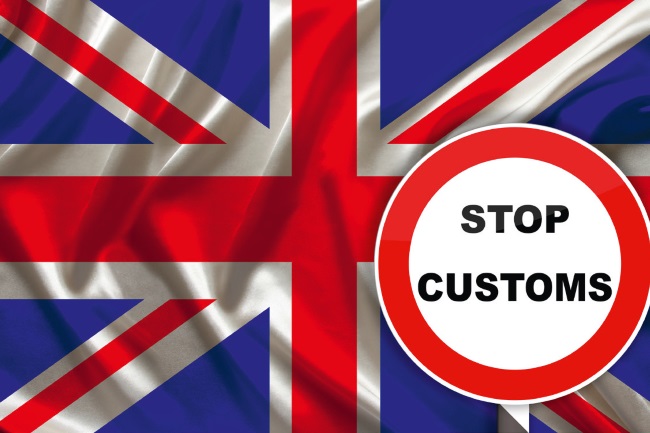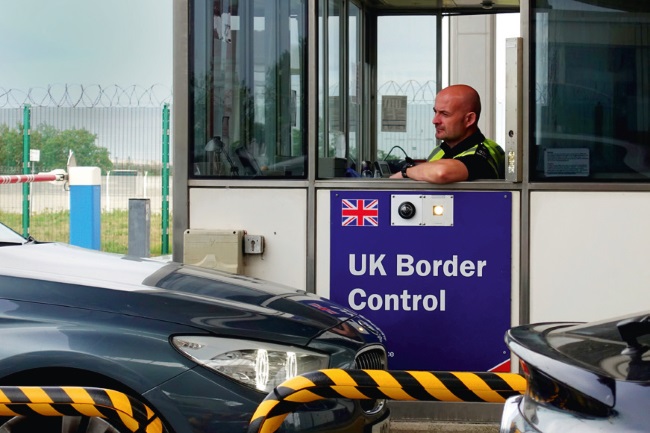In our latest European Politics article British journalist Martin Banks wonders if Britain is turning into a ‘Big Brother’ state?
It is a question being posed amid rising concern about difficulties some people from mainland Europe (including Brits who happen to live in Europe) are experiencing in getting to the UK.
Is it just about increased and understandable “security concerns” surrounding the Ukraine conflict? Is it a “reflection” in some way of the current UK government? Is it Brexit related? Or is it just a national border force pushing things to the limit of their legal powers?
Even former UK PM David Cameron’s lorry he was driving back from delivering relief supplies for the Ukraine to a Polish address was reportedly searched at Calais by the UK Border Force. That was after driving without challenge through Poland, Germany and France.
While most evidence is anecdotal (in the absence of any hard data), there is rising concern about the UK Border Force’s actions.
This writer (and his Belgian family) were themselves recently stopped and (in my case) detained and questioned by the border force, ostensibly under the 2019 “Counter Terrorism and Border Security Act,” introduced in the UK partly as a response to the Salisbury poisoning attacks.
In our case, the police used a six-hour detention to question me, largely (although not exclusively) about my journalism and journalistic activities. I was not arrested or charged but certain items including two mobile phones were retained by the police for a week.
Was this a one off? Well, other people say that, since Brexit in particular, they have noticed a “change of attitude” at the UK border. This magazine has testimony from a former British Labour MEP who says he was “repeatedly” stopped and questioned by British border police when travelling to and from Brussels to London. A current UK House of Lords member says he too was similarly quizzed by border police, adding that it was “only when I told them I was a peer that they allowed me to continue.”
The Guardian newspaper has run numerous articles about EU citizens being routinely detained, fingerprinted (as I was) and allegedly treated with hostility and suspicion.
So, what exactly is going on?
For one former member of Tony Blair’s cabinet, it all smacks of an increasingly and rather disturbing Orwellian mentality in the UK.
Denis MacShane, a former Europe Minister in the UK, said: “Anecdotes are not data, but Britain seems to be doing its best to be as unfriendly as possible to anyone entering the UK since the full-on hard Brexit ordained by Boris Johnson after the 2019 general election has come into force.
“Since time immemorial if a state gives a frontier official some power to stop, question, delay, harass someone entering a country then the iron law of jobsworths kicks in. When we were part of Europe, UK Border Force functionaries had to accept people could go back and forth freely, including British citizens. But now we have had all those rights removed by the Home Office as part of Home Secretary Priti Patel’s hard line Brexit ideology and it is much easier for jobsworths in their semi-military blue fatigues, boots and caps to stop and question anyone they want to.”

The former Labour cabinet minister said, “It’s like travelling to semi-democratic countries in the 1970s when local frontier cops made it clear they were doing you a big favour by letting you enter.”
While complaints made so far come largely from EU citizens travelling or returning to the UK, the rare case of a journalist being detained has sparked fears among journalist unions and their representatives about reporters being targeted – and even the possible emergence of (in the words of the National Union of Journalists) a “police state”.
Willy Fautre, who runs the respected Brussels-based NGO, Human Rights Without Frontiers, shares such concerns, saying: “It is a shocking violation of press freedom to detain for six hours a well-known British journalist covering for many years EU issues in Brussels without the UK Border Force telling him at any time the reasons of this procedure. It is a grave violation of human rights to interrogate him for hours about his journalistic activities. It is an egregious violation of a journalist’s freedom to be deprived of his computer and his mobile telephone for a week. The UK Border Force had hereby access to details of his private and professional life.”
The Belgian said: “People, including members of the European Parliament, that he had interviewed, sometimes, under cover of anonymity, could be identified; the confidentiality of their sayings and their anonymity were hereby broken. All these sources and contacts are now in the hands of the police, the intelligence services and the counter-terrorist services of the UK and are vulnerable to any manipulation.”
Eric Johnson, who helps developing-world journalists with cybersecurity and tracks such cases, said, “A journalist’s inviolable shield is the right to preserve the confidentiality of sources. If a law-enforcement agent has a right to get into your device(s) (smartphone, computer), that makes a mockery of that shield.”
An NUJ source said, “The UK Home Office may well try to claim heightened security following the Ukraine invasion, but I’ve seen several tweets in the last couple of weeks complaining about trouble from the UK Border Force for Brits re- entering the UK.”
The border issue is not confined to the UK.
Brussels-based journalist Maround Labaki, a former president of the Brussels Press Club, was prevented from taking the Beirut to Brussels plane, saying: “At the boarding gate, a zealous Lebanese General Security agent spotted the remains of a yellow sticker, mostly torn off, on the back of my Belgian passport, with an anonymous barcode, and said unpleasantly: “You’ve been to Israel!”.
“I replied, ‘Yes, quite a few times, because I’m a Belgian journalist and it’s part of my job.’
“The plane left without me. I was transferred to the General Security premises in the airport basement where I was immediately relieved of my smartphone and questioned about my articles on Israel (published in the Belgian daily Le Soir).
“He wasn’t interested in the freedom of the press. He said to me: ‘As a Lebanese national, you did something very serious by going to Israel because Israel is our enemy.’
“I was not a spy, just a Belgian journalist of Lebanese origin who had been doing his job.”
Labaki was eventually released but says the ordeal has (like this writer) left its mark.
We live in an increasingly dangerous world, so no one disputes the need for sometimes tough and heightened security, and everyone respects the legitimate right of the police to do their job.
The horrific 2018 Novichok poisoning of Russian double agent Sergei Skripal and his daughter still sends ripples through Salisbury and the lives of its townsfolk. No one has yet been brought to justice for that terrible attack which killed an innocent 44-year-old woman.
But, aside from who was responsible, another current burning question is how to balance genuine, necessary and widely-held security concerns with the perfectly legitimate rights of people who have done nothing wrong to travel freely and unhindered. When questioned, a UK government spokesperson said, “We do not comment on individual cases.
“The Schedule 3 Code directs officers to exercise these powers fairly and responsibly with respect for the people to whom they have been applied, and in accordance with human rights legislation. According to the code of practice, the selection of a person for examination must not be arbitrary or for discriminatory reasons.”
European Union Gateway







